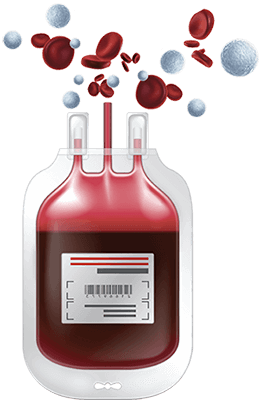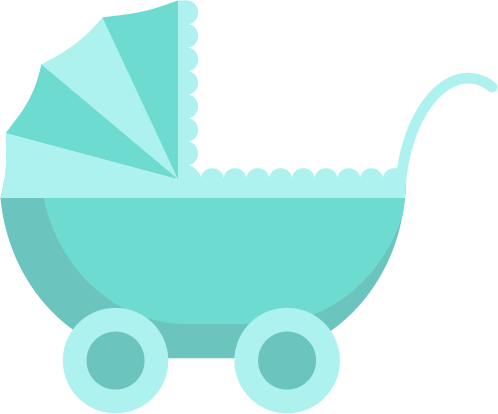Canada's Largest & Oldest Cord Blood Bank
Are you finally starting to feel like you are getting the hang of this parenting thing? We are sorry to have to tell you that your baby will be hitting the 4 month sleep regression soon.
Milestones This Month

Most babies can
- Hold the head up for a long time
- Do mini push-ups
- Coo at you
- Bear weight on legs

Half of the babies can
- Reach out and grab toys
- Sit up right when propped
- String vowels together “ga-ga-ga” or “ba-ba-ba”

A few babies can
- Babble or imitate speech
- Roll over from tummy to back
- Cut the first tooth
Baby Development at 4 Months
Your baby may have doubled his or her birth weight by 4 months. According to the growth charts from the World Health Organization, an average 4-month-old baby girl should way around 14.2 pounds (6.44 kilograms) and a 4-month-old boy around 15.4 pounds (6.99 kilograms).
Your little one’s skills are developing leaps and bound this month. His or her motor skills are improving so much that your little one may be able to roll from the tummy on to the back. When on his or her tummy, your little one is likely able to lift the head and shoulders off the ground with the support of the arms.

If your baby is adventurous, he or she may also try to crawl but kicking the legs hard when on their belly. Try to place your baby on a wood or tiled surface that makes it easier to move. Place a toy in front (just out of reach) to encourage your baby to move.
Finally, but perhaps most importantly, you will notice your baby stringing vowels together soon. He or she may repeat “ga-ga-ga” or “ba-ba-ba” repeatedly, which means “mama” or “dada” may not be far off. Talking to your baby often, reading and listening to music will encourage the development of these early language skills.
Vaccines
Your baby will receive another round of vaccines this month. A word of caution, your baby may recognize the doctor and associate the office with vaccinations this time around. Try to make this visit as fun and comfortable as possible. If you are breastfeeding, you may want to feed your baby while he or she is receiving vaccination. You will also want to sooth your baby post vaccinations by introducing a new toy or an activity to make sure the event is remembered in a positive fashion.
Some babies will have a mild reaction following this vaccination. Your baby may develop a rash, a fever or have a sore leg. Make sure you talk to your healthcare provider about giving your baby pain relievers to reduce the discomfort. A soothing bath can help as well.
Immunity, Infections and Vaccines
This lesson explores the immune system and how humans develop immunity in response to pathogens or vaccines.
Each day we are exposed to a variety of different pathogens in the environment such as bacteria and viruses. When one of these microbes happens to get inside our bodies, being able to recognize them as being invaders so they can be destroyed is very important. This sums up immunity. The immune system can recognize pathogens and destroy them before they can take over our bodies.

Baby Tip
Try try propping your baby up on a pillow in a seating position. If your baby has good head control and does not slip off or slump down, he or she may be ready to sit assisted for a short period of time.

Supporting Your Baby
Feeding
Your baby should still be on an exclusively liquid diet at 4 months. He or she will still be feeding every 4 to 6 hours. However, the time it takes your little one to feed on the breast may be getting shorter. All you need to make sure is that he or she is gaining weight steadily. Your formula-fed baby will take around 6 to 8-ounce bottle at least five time a day, amounting to 24 to 36 ounces of formula.
Some parents choose to feed solids at 4 months. However, most doctors recommend waiting until 6 months before introducing solids to your baby. This is because babies have an “open gut” meaning the space between cells in the digestive system are large until around 6 months. This allows whole proteins to pass from the small intestine into the blood stream, which is necessary for antibodies in breast milk to pass into the baby. If larger food molecules or bacteria are to pass through to the bloodstream this will result in allergies and infections.

Sleep
A typical 4-month-old should be getting around 12 to 16 hours a day. This will be broken in to three naps and 9 to 11 hours of sleep at night (interrupted of course!). Babies are unique creatures, so the amount of sleep will depend on your little one. How do you make sure your baby is getting enough sleep? If your baby is happy, active and alert, he or she is probably getting enough sleep. If your baby is always cranky, then perhaps he or she needs more sleep.
At 4 months, babies go through a sleep regression. So, it may become extremely difficult to get your baby to sleep. He or she may wake up frequently at night and be crankier. This sleep regression is actually a sign that your baby’s sleep patterns are maturing, because your baby is now establishing the sleep-wake pattern he or she will follow into adulthood. This is actually good news, because it means your baby will be sleeping through the night soon.
We already mentioned that babies hit many developmental milestones like rolling over, recognizing faces and babbling this month. These newfound skills are partly the reason behind the sleep regression, because when the baby is too busy practicing these skills it becomes difficult to fall asleep. You may want to minimize practicing new skills before bedtime, keep the bedroom dark and try not to stimulate your baby too much before bed.
Many parents find the 4-month sleep regression is the hardest to handle. Just remember this too shall pass!




